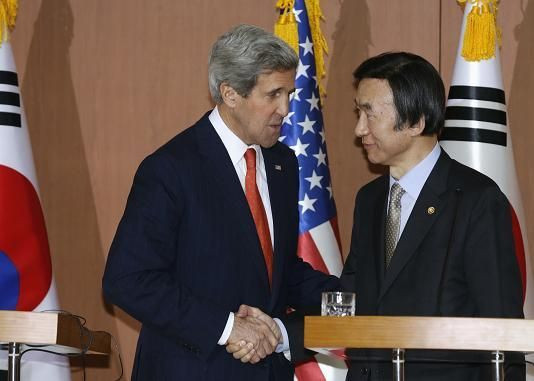Kerry Visits South Korea Amid Threats From Pyongyang; Kerry Scheduled To Visit Beijing, Tokyo In Three-Day Tour

U.S. Secretary of State John Kerry arrived in South Korea on Friday amid simmering tensions in the region fueled by North Korea’s increasingly belligerent rhetoric.
Kerry’s three-day visit to Seoul, Beijing and Tokyo is expected to focus on Pyongyang’s recent nuclear threats and provocations.
The top U.S. diplomat’s visit to South Korea coincides with the disclosure of a new U.S. intelligence report suggesting North Korea may have the ability to deliver a nuclear weapon on a missile.
U.S. officials sought to play down concerns about the nuclear capabilities of the North Korean leadership, after a Defense Intelligence Agency report was disclosed by a congressman at a congressional hearing in Washington.
Pentagon spokesman George Little said afterward that "it would be inaccurate to suggest that the North Korean regime has fully tested, developed or demonstrated the kinds of nuclear capabilities referenced" at the congressional hearing, the Associated Press reported.
James Clapper, the director of national intelligence, noted that the report referenced at the hearing was compiled by the Pentagon's Defense Intelligence Agency and was not an assessment by the entire U.S. intelligence community. "Moreover, North Korea has not yet demonstrated the full range of capabilities necessary for a nuclear-armed missile," he said.
Kerry, who is on first foray to the Asia-Pacific region as Secretary of State, is likely to depend on China to pressure Pyongyang to abide by its previous agreements to halt its nuclear and ballistic missile programs.
The U.S. believes Beijing could take several specific steps, including cutting off support for North Korea's weapons program, to show leadership and prevent North Korea from threatening regional stability, the AP reported, citing a senior State Department official traveling with Kerry, and another senior administration official. However, the two officials denied that the U.S. is seeking a commercial embargo against the North.
"It is no secret that China has the most leverage, the most influence with North Korea," another U.S. official said. "We would want them to use some of their leverage because otherwise, it is very destabilizing and, in the end, it threatens the whole region."
"China is increasingly concerned about the downstream effects of North Korea's reckless pursuit of nuclear missile capability and the implications for China's own strategic environment," the U.S. official added.
"We all hear a growing tone of frustration and urgency in the official statements from the Chinese," he added.
Chinese President Xi Jinping, in a speech at the BOAO economic forum in the southern Chinese island of Hainan, said on Tuesday that no country "should be allowed to throw a region and even the whole world into chaos for selfish gain,” without referring explicitly to North Korea.
© Copyright IBTimes 2024. All rights reserved.






















